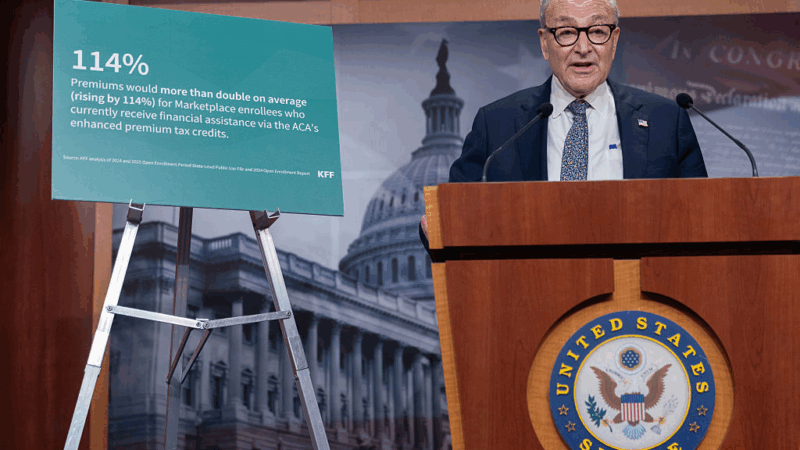What’s behind the health care fight that led to the government shutdown
A fight over health policy drove the current federal government shut down.
At issue is the cost of premiums for health care plans people buy on the Affordable Care Act, or Obamacare, marketplaces.
Enhanced tax credits for these premiums expire at the end of the year. Since 2021, those have kept ACA plans affordable for people who get their insurance this way.
Earlier this week, Democrats in the Senate refused to vote for the Republican short-term funding bill which did not include an extension of the enhanced premium tax credits.
So why do they matter?
The enhanced tax credits are important for people who don’t get health insurance through their job or a public program like Medicare or Medicaid. This year enrollment hit a record 24 million.
That is only about 7% of the U.S. population, but the people who rely on these plans are an influential group that includes small business owners, farmers and ranchers, says Cynthia Cox, vice president and director of the Program on the ACA at the nonpartisan health research organization KFF.
Cox and her team just did an analysis on what will happen to people’s premiums next year if Congress doesn’t extend the enhanced subsidies.
“On average, we’re expecting premium payments by enrollees to increase by 114%,” she says.
That means a lot of people are going to have to pay double the monthly premium they’re paying now.
Or, says Cox, they might have to switch to a higher deductible plan, change jobs to one that offers insurance, or they might lose their coverage.
The Congressional Budget office estimates that 4 million people will become uninsured if the enhanced tax credits expire.
It also estimates that extending the policy will cost the government a lot — $350 billion over 10 years.
Premium tax credits have been critical to increasing enrollment in ACA plans.
When the ACA was passed in 2010, Congress created a sliding scale to give people a break on their premiums based on income. But premiums were still too high for a lot of people and those with incomes above 400% of the federal poverty level had to pay full price, says Sabrina Corlette, project director at the Center on Health Insurance Reforms at Georgetown University.
“So there was a chunk of folks who just were really struggling to afford” their premiums, she says. And enrollment was sluggish.
So in 2021, Congress stepped in with a lot more federal funding, which made premiums more affordable for people of all income levels.
It was an “incredibly successful effort to get more people into coverage and reduce the uninsured rate,” says Corlette.
Some Republican lawmakers say the current enhanced tax credits are just too expensive. Other Republicans say they’re open to extending the policy but not as part of the shutdown fight.
“That premium support program doesn’t even expire until next year. So why are you shutting down the government on October 1 because of a program that doesn’t even expire for another few months?” Vice President JD Vance said on Fox News Wednesday.
Sen. Patty Murray, D-Wash., says actually, it is an urgent issue. As she explained in a press conference Wednesday, open enrollment for ACA plans starts Nov. 1.
“Later is too late,” she said. “The new higher health care rates, those are being set right now. Notifications to families — they’re in the mail now. Open enrollment is weeks away and families are panicking.”
For Cox, having this relatively small slice of the health insurance pie dominating the political universe takes her back to the repeal and replace fight of 2017 and countless standoffs over the Affordable Care Act since then.
“Obamacare has always been the center of a political firestorm, at least in health policy, she says. “Here we are again.”
Mixed reactions, including relief, greet news the Coast Guard is buying BSC campus
The U.S. Coast Guard will take possession of the 192-acre campus in the northeast corner of Birmingham’s Bush Hills Neighborhood and will begin work to refit it as a training center for officers and enlisted personnel.
Travel industry pushes Congress to end DHS shutdown and pay federal security workers
With the busy spring break travel season looming, travel and aviation industry leaders urged Congress to end the stalemate over DHS funding before workers at TSA and ports miss a full paycheck.
Trump fires Kristi Noem as DHS chief, names Sen. Markwayne Mullin to replace her
President Trump has fired his homeland security secretary, Kristi Noem, and said Markwayne Mullin, a senator from Oklahoma, would replace her.
They were led off course in a big race. But a fix is more complicated than prize money
Top finishers in the Atlanta half marathon are calling for U.S. track officials to ensure that Jess McClain and two other athletes aren't excluded from the world championships because of an error.
No matter what happens at the Oscars, Delroy Lindo embraces ‘the joy of this moment’
Lindo is nominated for best supporting actor for his role in Sinners. At the BAFTA awards on Sunday, Lindo was presenting when a man with Tourette syndrome in the audience yelled out a racial slur.
Between Megan Moroney and Ella Langley, country women rule the charts
It's a big week for women in country music — and, it turns out, for women whose songs are favored by women in figure skating.








